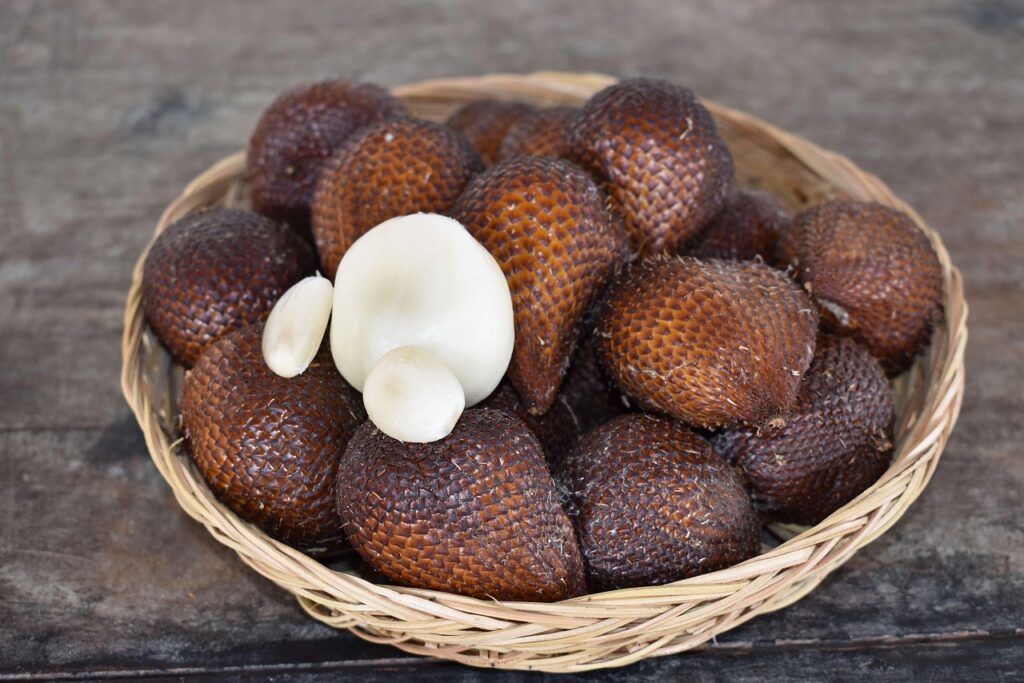Have you ever heard of salak, also known as snake fruit? This exotic tropical fruit, native to Indonesia and parts of Southeast Asia, gets its name from its reddish-brown scaly skin that resembles snake scales. Beneath that unique exterior lies a sweet, tangy, and crunchy fruit packed with surprising health benefits.
Whether you’re a fruit enthusiast or simply curious about natural superfoods, here’s everything you need to know about salak—its benefits, nutritional properties, and possible contraindications.
Health Benefits of Salak
1. Rich in Antioxidants
Salak is a great source of antioxidants such as beta-carotene, tannins, and vitamin C, which help fight free radicals, slow down cell damage, and support healthy skin and immunity.
2. Supports Eye Health
Thanks to its high beta-carotene content, salak is often called the “fruit of memory and the eyes.” Regular consumption may help protect against age-related vision problems and promote sharper eyesight.
3. Improves Digestion
The fruit contains a good amount of dietary fiber, which aids digestion and helps regulate bowel movements. In moderation, salak can help prevent constipation and promote gut health.
4. Boosts Memory and Brain Function
Salak is rich in potassium and pectin, both of which play a role in supporting cognitive function, improving concentration, and boosting memory. In some cultures, it’s even nicknamed the “memory fruit.”
5. Supports Weight Management
Because salak is high in fiber and nutrients yet relatively low in calories, it can keep you fuller for longer, reduce unnecessary snacking, and support healthy weight control.
Nutritional Properties of Salak
A 100-gram serving of salak typically provides:
- Calories: ~80–100 kcal
- Carbohydrates: ~22–25 g
- Fiber: ~2–3 g
- Vitamin C
- Potassium
- Iron
- Calcium
- Beta-carotene
This makes salak a nutrient-dense fruit that combines sweetness with health-supportive minerals and vitamins.
⚠️ Contraindications and Precautions
While salak offers plenty of health benefits, it’s not suitable for everyone in large quantities.
- Risk of Constipation: Because of its high tannin and fiber content, eating too much salak can actually cause constipation instead of preventing it.
- Not Ideal for People with Hemorrhoids: The astringent properties of tannins may worsen hemorrhoid symptoms if consumed excessively.
- Diabetes Considerations: Although salak has a moderate glycemic index, its natural sugars can still raise blood sugar levels. People with diabetes should monitor their intake carefully.
- Digestive Sensitivity: Those with sensitive stomachs or digestive issues should introduce salak gradually to avoid bloating or discomfort.

Salak is more than just an exotic fruit with an unusual appearance—it’s a nutritious powerhouse with antioxidants, fiber, and essential minerals that support vision, memory, digestion, and overall wellness. Like all fruits, moderation is key. Enjoying salak as part of a balanced diet can bring both taste and health benefits, while overindulgence may cause unwanted digestive issues.
If you get the chance to try this “snake fruit,” don’t be put off by its scaly skin—you might just discover your new favorite tropical snack!

